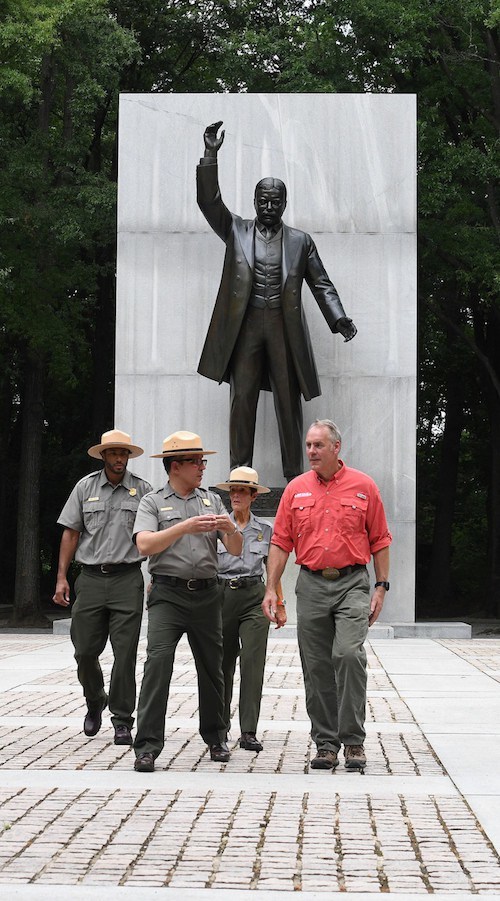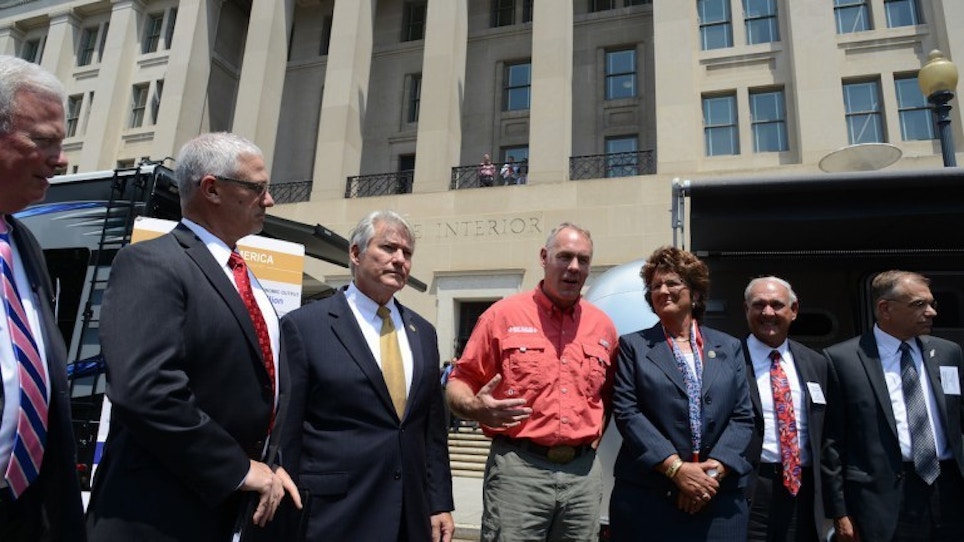On Tuesday, July 18, U.S. Secretary of the Interior Ryan Zinke met with members of the Outdoor Recreation Industry Roundtable (ORIR), including Jay McAninch of the Archery Trade Association, to discuss expanding public-private partnerships in order to improve the visitor experience on public lands and waters and promote outdoor recreation.
“In your experience from the industry side, you may know that the government sometimes isn’t the cutting edge of innovation,” Zinke said. “But you are. On the government side, what we have to do is public-private partnerships to leverage that innovation.”
In responding to concerns over the privatization of public land, Zinke stressed that he’s looking at partnerships and pointed out that these partnerships already exist today.
Public-private partnership already exists on public land
“If you go in our parks, usually the lodging is managed by a public-private partnership,” he said. “(Vendors) manage the food dispensary; the rangers aren’t making hot dogs. A lot of our boat concessionaires, going out to Alcatraz, going out to our Statue of Liberty, are done through a public-private partnership. What we’re looking at is providing some stability, longer-term contracts so they can invest in things like improving our campgrounds.”'

On Tuesday, July 18, U.S. Secretary of the Interior Ryan Zinke, department staff and park services employees met with members of the Outdoor Recreation Industry Roundtable to discuss expanding public-private partnerships. Photo: Department of the Interior
These partnerships are a major part of Zinke’s plan to address outdated infrastructure. Speaking of today’s parks, he said, “A lot of them are from the Eisenhower era. They weren’t made for RVs that have slideouts. They were really made for your station wagon, with a pop-up or a tent. We have to adjust to how Americans enjoy their outdoor experience today. A lot of it is just what we see here. It’s towed vehicles, it’s RVs, it’s air conditioning, it’s Wi-Fi.
“The young kids, a lot of them don’t want to go to our parks, because, ‘I can’t be on the Wi-Fi and send pictures to my friends.’ So we’re going to adapt to what America wants and that is moving to make sure the recreation experience is enhanced and sustained.”
Zinke had asked industry leaders to develop 10 initiatives that would enhance the outdoor experience. At the meeting, the ORIR presented him with 27 initiatives that touched on such things as expanding Wi-Fi connectivity in parks, upgrading visitor accommodations and expanding visitor services.
“Of the 27 items that were proposed, our head of our parks service said we’re going to get to ‘yes,’” Zinke pledged. “That is a distinct difference in attitude, and I guess it boils down to this: I work for you. This is a new experience; the Department of Interior works for the people. The people don’t work for the Department of Interior. That means our citizens deserve the best parks experience, the best recreational experience, the best utilization of our public lands, and that’s what we’re going to deliver.”
After the meeting, Zinke announced his intent to create a new advisory board committee that will focus on expanding public-private partnerships.
“One of my top priorities is to expand recreational access to public lands and waters,” he said. “Today I’m excited to announce that, for the first time, the Department of the Interior will host a recreation advisory committee dedicated to looking at public-private partnerships across all public lands, with the goal of expanding access to and improving the infrastructure on public lands.”
U.S. Secretary of the Interior Zinke on “keeping public lands public”
Zinke also reiterated his commitment to keeping public lands public. At a press conference held at the memorial plaza on Theodore Roosevelt Island with a statue of Theodore Roosevelt behind him, Zinke said, “We’re not going to sell public land. We’re not going to transfer public land. But we are going to use public land to benefit of all Americans. We’re looking at multiple use; we’re looking at appropriate use. We’re looking at making sure that we use best science and best practices in our approach.
“Recreation today has a slice, but tomorrow that slice will be bigger because people are using our public lands more. The pressures on our public lands are increasing, so we have to look out 100 years — as Roosevelt did, a little more than 100 years ago today — to make sure that what we are doing today what is in the best interest of our public lands tomorrow and in the future.
“I’m not an advocate for selling or transferring public lands. But I’m an advocate of making sure public land is protected and used, and that’s a lot of infrastructure.”
Zinke looks to "right size" hunting
When asked about hunting and the shooting sports, Zinke said, “We want to promote hunting, fishing, recreation activities. We don’t want to side one activity over another, but certainly in the past few years the hunting has been downsized in lieu of other things, and we want to right size it. We should not be in the habit of picking and choosing market winners. We should be in the habit of promoting the outdoor experience whether you’re a bowhunter or just love hunting butterflies.”
Tuesday’s event also stressed the importance of outdoor recreation to the national economy. Outdoor recreation is vital to the economic and physical well-being of America and its citizens. According to industry analysis, the outdoor recreation industry generates $887 billion in direct spending and supports 7.6 million jobs across all 50 states.
Featured Photo: Department of the Interior






